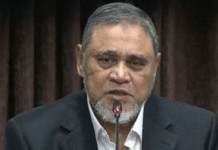
The UN Refugee Agency UNHCR has said it is rushing relief supplies to the Bangladesh-Myanmar border areas amid reports that around 10,000 additional Rohingyas crossed into Bangladesh on Monday.
This sudden influx is followed by the recent slow inflow of forcefully displaced Myanmar nationals.
However, locals in the Anjumanpara area of south-eastern Bangladesh have reported hearing gunfire in Myanmar recently, pointing that violence has erupted in the region again.
According to Bangladesh border guards, the influx through the Anjumanpara border crossing point started on Sunday night and had passed the 6,000 mark by Monday afternoon.
Thousands more are said to be on their way, said the UNHCR.
The ones who made it across the border to Bangladesh, many said they fled from Buthidaung in Myanmar’s northern Rakhine state, walking for 12 to 14 days to reach the border.
Many of the new arrivals were taken by the authorities to the Kutupalong and Balukhali areas about 20 km away, where refugee camps and settlements already exist.
Several thousand new arrivals were also reported at other entry points south of Anjumanpara, including Shahpori Dwip.
The United Nations High Commission for Refugees or UNHCR has loaded trucks with plastic sheets for immediate delivery once the law enforcers verify the location of the new shelter seekers.
The UN Refugee Agency has also asked partner agencies to pre-position food, water and other life-saving supplies for the new refugees, many of whom are exhausted from the long and treacherous journey.
In Shahpori Dwip near the southern tip of Bangladesh, UNHCR is already supporting the authorities at a transit centre for boat arrivals.
The series of drownings reported since late September underscore the importance of rescue operations for those fleeing by boat from Myanmar.
More than a dozen refugees have drowned recently over the weekend, which includes children and women.
Since the violence started in northern Rakhine state in late August, nearly 520,000 refugees have sought safety in Bangladesh, joining an estimated 300,000 Rohingya refugees who have been hosted here since the 1990s.
The UN Refugee Agency is coordinating its response with the Bangladesh government and partners to enhance preparedness for potential influxes and pre-position relief supplies close to the reception areas.
Source: The Daily Ittefaq









